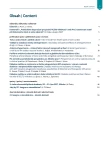Arterial hypertension – a risk factor for sudden vascular stroke
Authors:
Ľudovít Gašpar 1; Andrea Komorníková 1; Veronika Vestenická 2
Authors‘ workplace:
I. Interná klinika LF UK a UNB, Bratislava
1; I. neurologická klinika LF UK a UNB, Bratislava
2
Published in:
AtheroRev 2018; 3(1): 18-20
Category:
Reviews
Overview
Strokes are among the most common causes of morbidity and mortality, and in individuals who suffered stroke, subsequent long-term neurological deficit in a larger or smaller range is also an important factor. Numerous clinical and epidemiological studies have confirmed that elevated systemic blood pressure values are among the major risk factors for both ischemic and haemorrhagic stroke, and the effect of arterial hypertension is complex with morphological and functional vascular changes and changes in vascular cerebral circulation. In our retrospective analysis of 104 patients hospitalized for stroke, we found the presence of arterial hypertension in 92.3 % and atrial fibrillation in 32.7 %. 88 persons of our cohort (84.6 %) had been diagnosed with ischemic stroke and 16 persons of our cohort (15.4 %) with haemorrhagic stroke. In the group of patients with atrial fibrillation, only 14 patients (41.2 %) were treated by anticoagulant, what points out an inadequate indication of anticoagulant treatment when considering the stroke risk calculation for atrial fibrillation (CHA2DS2-VASc Score) and bleeding risk (HAS-BLED Calculator for Atrial Fibrillation). It is also noteworthy that in the group of patients with anticoagulant therapy who have evolved ischaemic stroke in spite of this treatment, we found that in 53.8 % the treatment was underdosed and therefore ineffective. Our work points to the need to improve the effective management of arterial hypertension and atrial fibrillation, the most common influencing factors of strokes.
Key words:
anticoagulant therapy, arterial hypertension, atrial fibrillationk main risk factors of stroke, stroke
Received:
28. 11. 2017
Accepted:
18. 12. 2017
Sources
1. Mancia G, Fagard R, Narkiewicz K et al. 2013 ESH/ESC guidelines for the management of arterial hypertension: the Task Force for the Management of Arterial Hypertension of the European Society of Hypertension (ESH) and of the European Society of Cardiology (ESC). Eur Heart J 2013; 34(28): 2159–2219. Dostupné z DOI: <http://dx.doi.org/10.1093/eurheartj/eht151>.
2. Goldstein LB, Adams R, Alberts MJ et al. Primary prevention of ischemic stroke: a guideline from the American Heart Association/American Stroke Association Stroke Council. Stroke 2006; 37(6): 1583–1633. Dostupné z DOI: <http://dx.doi.org/10.1161/01.STR.0000223048.70103.F1>. Erratum in Stroke 2007; 38(1): 207.
3. Huang Y, Cai X, Li Y et al. Prehypertension and the risk of stroke: a meta-analysis. Neurology 2014; 82(13): 1153–1161.Dostupné z DOI: <http://dx.doi.org/10.1212/WNL.0000000000000268>
4. Lackland DT, Roccella EJ, Deutsch AF et al. Factors influencing the decline in stroke mortality: a statement from the American Heart Association/American Stroke Association. Stroke 2014; 45(1): 315–353. Dostupné z DOI: <http://dx.doi.org/10.1161/01.str.0000437068.30550.cf.>.
5. O´Donnell MJ, Xavier D, Liu L et. al. Risk factors for ischaemic and intracerebral haemorrhagic stroke in 22 countries (the INTERSTROKE study): a case-control study. Lancet 2010; 376(9735): 112–123. Dostupné z DOI: <http://dx.doi.org/10.1016/S0140–6736(10)60834–3>.
6. Benavente OR, Coffey CS, Conwit R et al. Blood-pressure targets in patients with recent lacunar stroke: the SPS3 randomised trial. Lancet 2013; 382(9891): 507–515. Dostupné z DOI: <http://dx.doi.org/10.1016/S0140–6736(13)60852–1>. Erratum in Lancet 2013; 382(9891): 506.
7. Arima H, Chalmers J. PROGRESS: Prevention of recurrent stroke. J Clin Hypertens (Greenwich) 2011; 13(9): 693–702. Dostupné z DOI: <http://dx.doi.org/10.1111/j.1751–7176.2011.00530.x>.
8. Lionakis N, Mendrinos D, Sanidas E et al. Hypertension in the elderly. World J Cardiol 2012; 4(5): 135–147. Dostupné z DOI: <http://dx.doi.org/10.4330/wjc.v4.i5.135>.
9. Tuzcu EM, Kapadia SR, Tutar E et al. High prevalence of coronary atherosclerosis in asymptomatic teenagers and young adults. Evidence from intravacular ultrasound. Circulation 2001; 103(22): 2705–2710.
10. Mottillo S, Filion KB, Genest J et al. The metabolic syndrome and cardiovascular risk a systematic review and meta-analysis. J Am Coll Cardiol 2010; 56(14):1113–1132. Dostupné z DOI: <http://dx.doi.org/10.1016/j.jacc.2010.05.034>.
11. Van den Ham HA, Klungel OH, Singer DE et al. Comparative performance of ATRIA, CHADS2, and CHA2DS2-VASc risk scores predicting stroke in patients with atrial fibrillation. JACC 2015; 66(17): 1851–1859. Dostupné z DOI: <http://dx.doi.org/10.1016/j.jacc.2015.08.033>.
12. Pisters R, Lane DA, Nieuwlaat R et al. A novel user-friendly score (HAS-BLED) to assess one-year risk of major bleeding in atrial fibrillation patients: The Euro Heart Survey. Chest 2010; 138(5): 1093–1100. Dostupné z DOI: <http://dx.doi.org/10.1378/chest.10–0134>.
13. Fagard RH. Dipping pattern of nocturnal blood pressure in patients with hypertension. Expert Rev Cardiovasc Ther 2009; 7(6): 599–605. Dostupné z DOI: <http://dx.doi.org/10.1586/erc.09.35>.
14. Castilla-Guerra L, Fernandez-Moreno MC. Chronic management of hypertension after stroke: The role of ambulatory blood pressure monitoring. J Stroke 2016; 18(1): 31–37. Dostupné z DOI: <http://dx.doi.org/10.5853/jos.2015.01102>.
15. [PATS Collaborating Group]. Post-stroke antihypertensive treatment study: a preliminary result. Chin Med J (Engl) 1995; 108(9):710–717.
16. [PROGRESS Collaborative Study Subgroup]. Randomized trial of perindopril based blood pressure-lowering regimen among 6108 individuals with previous stroke or transient ischemic attack. Lancet 2001; 358(9287): 1033–1041. Dostupné z DOI: <http://dx.doi.org/10.1016/S0140–6736(01)06178–5>. Erratum in Lancet 2001; 358(9292): 1556. Lancet 2002; 359(9323): 2120.
17. Ovbiagele B. Low-Normal systolic blood pressure and secondary stroke risk. J Stroke Cerebrovasc Dis 2013; 22(5): 633–638. Dostupné z DOI: <http://dx.doi.org/10.1016/j.jstrokecerebrovasdis.2011.12.003>.
Labels
Angiology Diabetology Internal medicine Cardiology General practitioner for adultsArticle was published in
Athero Review

2018 Issue 1
-
All articles in this issue
- Fats in foods from health point of view
- Secondary and adverse effects of antihypertensive drugs
- Arterial hypertension – a risk factor for sudden vascular stroke
- Peripheral arterial disease of lower extremity and global cardiovascular risk
- Diabetes mellitus and heart failure: the role of SGLT2 inhibitors
- Diabetes mellitus and resistance to therapy with ADP-receptor antagonists: Importance, possibilities of detection and therapeutic influence
- Perspectives on central systolic pressure in clinical practice
- Athero Review
- Journal archive
- Current issue
- About the journal
Most read in this issue
- Secondary and adverse effects of antihypertensive drugs
- Fats in foods from health point of view
- Peripheral arterial disease of lower extremity and global cardiovascular risk
- Diabetes mellitus and heart failure: the role of SGLT2 inhibitors
